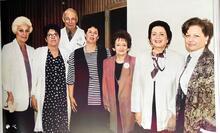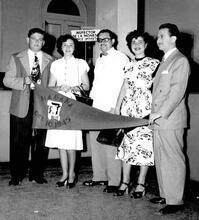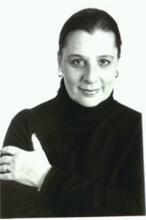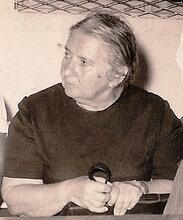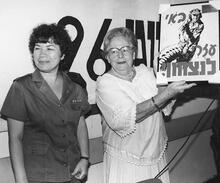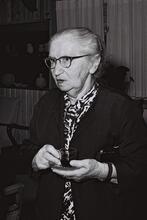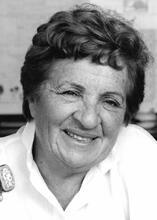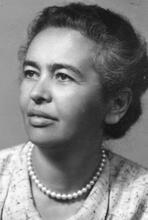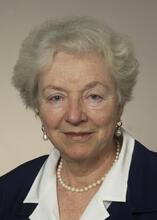Rose Gell Jacobs
Rose Jacobs was the most prominent leader of Hadassah in the 1930s and one of the most important in the organization’s history. She helped create several Hadassah chapters, edited the national Hadassah News Bulletin, and served as both acting president and president of Hadassah. Jacobs played a significant role in American Zionist efforts to build up Palestine in the late 1930s, including improving the area’s medical facilities and fostering the immigration of German Jewish youth to the Holy Land through Youth Aliyah. She also broke the glass ceiling in the Zionist movement by becoming the first woman to serve on the Jewish Agency Executive, only to find her work there handicapped by gender bias.
A member of the original circle of women who established Hadassah, the Women’s Zionist Organization, in 1912, Rose Jacobs epitomized the spirit of American Zionist voluntarism. She gradually rose from a grass-roots organizer to the leadership of the organization and came to play a central role in Zionist affairs worldwide.
Early Life & Family
Rose Gell Jacobs was born in September 1888 and, along with a brother and two sisters, was raised on the Lower East Side of New York City by her grandparents, Jewish immigrants from Lithuania. She studied at Hunter College and Columbia University and taught in the city’s public schools before moving to Atlanta to marry attorney Edward Jacobs, with whom she had two children, Joshua and Ruth.
Growing Involvement with Hadassah
While raising her children, Rose was active in a number of progressive organizations, including the League of Women Voters and the Women’s Department of the League of Nations. However, the bulk of her attention was devoted to Hadassah. She helped create Hadassah chapters in Georgia, Tennessee, and Washington, D.C., in the process gaining recognition as an articulate and effective Zionist speaker.
Jacobs was named editor of the national Hadassah News Bulletin in 1920, vice president of Hadassah shortly afterward, and acting president of the organization from 1920 to 1923, while Hadassah’s president and founder, Henrietta Szold, was in Palestine. Later Jacobs served two terms as president, from 1930 to 1932 and from 1934 to 1937. She was the most prominent Hadassah leader in the 1930s and one of the most important Hadassah leaders in the organization’s history.
During Jacobs’s second term, Hadassah’s membership urged the organization to move away from its exclusive focus on medical projects in Palestine and take a more active role in assisting the Jews in Nazi Germany. Jacobs was dispatched to Palestine in 1935 to explore possible new directions for Hadassah activity there. She became enamored of the Youth Lit. "ascent." A "calling up" to the Torah during its reading in the synagogue.Aliyah program, led by Szold, which facilitated the immigration of young German Jews to the Holy Land. Hadassah soon adopted Youth Aliyah, a decision that proved both a boon for fund-raising and a source of inspiration for Hadassah activists during the Nazi era. Brushing aside her colleagues’ fears for her safety, Jacobs traveled to Nazi Germany in the summer of 1936 to examine the plight of German Jewry firsthand and solidify Hadassah’s relationship with the Youth Aliyah program.
Involvement in International Zionism
An active participant in international Zionist affairs, Jacobs was named to the Jewish Agency Executive in 1937, becoming the first woman to serve on that body. However, she soon grew frustrated at the refusal of Agency chairman David Ben-Gurion and World Zionist Organization president Chaim Weizmann to assign her any responsibilities or include her in high-level policy discussions, a pattern of discrimination she attributed both to her gender and the fact that she was American. Disillusioned by this state of affairs, she resigned from the executive after just one year. Although her tenure on the executive was brief, Jacobs helped pave the way for greater acceptance of women in the top tiers of the world Zionist movement in the years to follow.
Under Jacobs’ leadership, Hadassah opposed the British Peel Commission’s 1937 Palestine partition plan, protesting the small size of the territory allotted to the proposed Jewish state. She was the only woman delegate to the St. James Conference in 1939, at which British, Arab, and Zionist leaders sought, unsuccessfully, to resolve the Palestine conflict.
Maintaining a prominent role in Hadassah affairs even after her terms as president, Jacobs was responsible for initiating the establishment of the Hadassah Hospital in 1939 on Mount Scopus, in Jerusalem. In 1940, she organized the Hadassah Emergency Committee in Palestine, which supervised the group’s Palestine affairs during the war years.
Views on Arab-Jewish Relations
Jacobs, like other prominent Hadassah leaders, was keenly interested in the subject of Arab-Jewish relations in Palestine. In the wake of Palestinian-Arab rioting and British restrictions on Jewish immigration in the late 1930s, Hadassah established the Committee for the Study of Arab-Jewish Relations, with Jacobs as its chair. It marked the first time that an American Zionist organization had taken an official interest in the problem of Arab-Jewish relations in Palestine. The committee, which operated until 1943, held private discussions on the subject and met with American experts on the Middle East and Zionist leaders from Palestine to discuss ways to alleviate Arab-Jewish tension. Ben-Gurion regarded the committee’s work as undue interference in a matter that should be the exclusive domain of the Jewish Agency leadership.
After World War II, Jacobs assumed a senior role in the ESCO Foundation, which raised funds for industrial development in Palestine (later Israel).
Rose Gell Jacobs died in New York City on August 14, 1975.
AJYB 77:595.
BEDAJ.
EJ.
Jacobs, Rose G. “The Beginnings of Hadassah.” In Early History of Zionism in America, edited by Isidore S. Meyer. American Jewish Historical Societ, 1958.
Rose Jacobs Papers. Hadassah Archives, NYC.
Miller, Donald H. “A History of Hadassah, 1912–1935.” Ph.D. diss., New York University, 1968.
Obituary. New York Times, August 16, 1975, 22:5.
Segev, Zohar. “From Philanthropy to Shaping a State: Hadassah and Ben-Gurion, 1937–1947," Israel Studies 18:3 (Fall 2013), pp. 133-157.
Shapiro, D.H. From Philanthropy to Activism: The Political Transformation of American Zionism in the Holocaust Years 1933-1945. Jerusalem: Bialik Institute, 2001. [Hebrew]
UJE.
WWIAJ (1938).
Yungman, Mira Katzburg, Hadassah, American Women Zionist and the Rebirth of Israel (2012).


